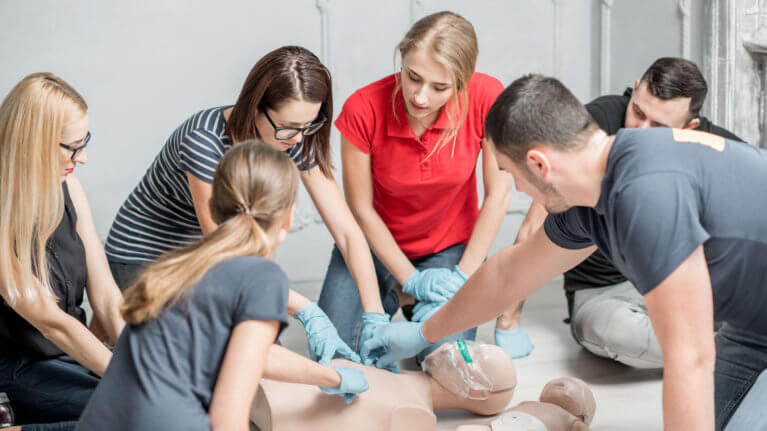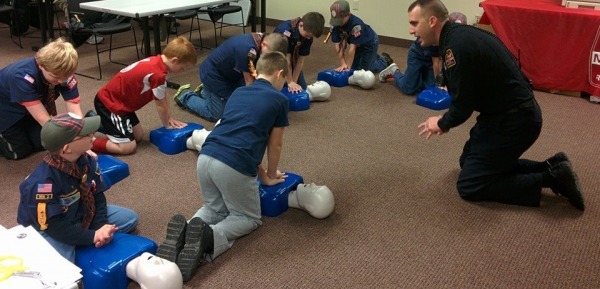Top Factors to Pursue CPR Certification Near Me This Year
Top Factors to Pursue CPR Certification Near Me This Year
Blog Article
Mouth-to-mouth Resuscitation Accreditation: Empower Yourself to Save Lives in Defining Moments
The importance of CPR qualification can not be overstated, specifically in a world where emergencies can develop unexpectedly. Getting this accreditation equips people with the skills needed to intervene properly during critical circumstances, such as heart attack or drowning. Past the instant technological understanding, the training cultivates a deeper feeling of community obligation and individual confidence in emergency situation preparedness. As we check out the numerous aspects of CPR training, one need to consider not only the sensible skills discovered yet also the wider effects of being certified. What does it really mean to be prepared when every 2nd matters?
Relevance of CPR Training
Cardiopulmonary resuscitation (MOUTH-TO-MOUTH RESUSCITATION) training is a crucial part of emergency readiness, furnishing individuals with the skills necessary to react properly in serious scenarios. The capacity to do CPR can significantly increase the opportunities of survival for sufferers of cardiac arrest, sinking, or various other emergencies where breathing or heart beat has actually ceased. With the immediate application of mouth-to-mouth resuscitation, blood flow can be maintained, maintaining crucial oxygen supply to the brain and other body organs.
Along with the physical abilities included, CPR training cultivates a sense of confidence and preparedness among individuals. Individuals that are trained in mouth-to-mouth resuscitation are most likely to take punctual action in emergency situations, potentially conserving lives. Community-wide Mouth-to-mouth resuscitation training initiatives add to a culture of security and readiness, equipping people to act decisively when encountered with crises.
Moreover, CPR training is not limited to medical care professionals; it is obtainable to the general populace. Schools, offices, and community organizations supply courses made to instruct laymans just how to do mouth-to-mouth resuscitation properly. This widespread understanding can create a network of qualified -responders, raising the chances of survival for those in demand and highlighting the important relevance of mouth-to-mouth resuscitation training in conserving lives.
CPR Qualification Process
Getting CPR certification involves a structured process that ensures individuals are adequately prepared to react to emergencies. The journey usually starts with selecting a reputable accreditation carrier, such as the American Heart Association or the Red Cross, which offer standardized courses recognized nationwide.
Enrollees should then complete a series of classes, which may be offered in-person, online, or as a hybrid version (CPR Certification Near Me). Each program includes necessary academic understanding, including the principles of cardiopulmonary resuscitation, the chain of survival, and the recognition of heart emergency situations
Complying with the training part, participants engage in sensible training where they exercise CPR methods on mannequins under the assistance of certified teachers. This hands-on part is vital for making sure efficiency in skills essential for real-life scenarios.
Upon successful completion of the coursework and sensible analyses, individuals should pass a last evaluation, which may consist of both composed and performance-based components. As soon as accredited, people typically receive a CPR accreditation card, valid for 2 years, after which recertification is essential to maintain skills and knowledge current. This structured strategy not only fosters confidence but additionally furnishes individuals with the crucial skills required to save lives throughout defining moments.
Skills Found Out in CPR Courses
mouth-to-mouth resuscitation programs outfit participants with essential skills that can be critical in emergency situation situations. One of the key skills discovered is the strategy of cardiopulmonary resuscitation itself, which includes upper body compressions and rescue breaths to maintain blood flow and oxygenation in an individual experiencing cardiac arrest. Individuals practice the appropriate hand placement, compression deepness, and these details rhythm to guarantee reliable resuscitation.
In addition to CPR, training courses cover making use of an Automated External Defibrillator (AED) Participants discover just how to recognize when an AED is needed and just how to operate the device, which can substantially boost survival rates during cardiac emergency situations.
Moreover, CPR training highlights the value of analyzing the scene and the victim's problem prior to carrying out help. Individuals are taught to recognize indications of choking and other lethal circumstances, allowing them to react appropriately.
Benefits of Being CPR Certified
Being CPR certified offers various advantages that prolong beyond private preparedness. One of the most significant benefits is the ability to react effectively in check that emergency situations, potentially conserving lives in critical scenarios. This qualification equips people with the expertise and abilities essential to execute mouth-to-mouth resuscitation and utilize an automatic outside defibrillator (AED), enhancing their confidence in taking care of life-threatening scenarios.

In addition, CPR certification can bolster occupation prospects in different areas, especially in medical care, education, and public safety and security. Numerous companies prioritize or require CPR qualification, acknowledging its worth in guaranteeing office safety. In addition, being certified can enhance area ties, as qualified people typically get involved in local health and wellness campaigns, instructing others the value of mouth-to-mouth resuscitation.
In addition, the act of ending up being mouth-to-mouth resuscitation licensed cultivates a feeling of empowerment and responsibility. It encourages individuals to take an active function in advertising wellness and safety and security within their communities. Ultimately, CPR accreditation not just prepares people to act emphatically in emergency situations yet also enhances their professional qualifications and cultivates a culture of preparedness that can lead to safer environments for all.
Resources for CPR Certification
While many people identify the relevance of mouth-to-mouth resuscitation qualification, accessing the appropriate sources to acquire this necessary training can be essential. CPR Group Training. Numerous organizations supply training courses, both on-line and in-person, to fit different learning preferences. The American Heart Organization (AHA) and the Red Cross are 2 of the most credible carriers, supplying detailed training programs that cover CPR techniques for youngsters, adults, and infants
In addition to typical class settings, on-line platforms such as mouth-to-mouth resuscitation Online and ProCPR supply versatile alternatives for those with hectic timetables. These programs typically include interactive simulations and videos to boost understanding. One more valuable source is local area centers or hospitals, which regularly host mouth-to-mouth resuscitation classes at reduced or no cost.
Additionally, educational establishments and Get More Info many work environments encourage or mandate mouth-to-mouth resuscitation training, making it simpler for people to access these life-saving skills. Constantly verify that the accreditation is approved and recognized by appropriate authorities. Spending time in these resources not only furnishes people with important abilities yet additionally fosters a culture of readiness and safety and security within communities.
Final Thought
In verdict, Mouth-to-mouth resuscitation accreditation offers as a crucial tool for individuals seeking to contribute to area safety and security and readiness. By ending up being CPR accredited, individuals enhance their capacity to react successfully in important circumstances, eventually playing a significant role in protecting life and promoting well-being within their communities.

While numerous people acknowledge the relevance of CPR qualification, accessing the right sources to acquire this essential training can be pivotal.In conclusion, Mouth-to-mouth resuscitation accreditation offers as a crucial tool for individuals looking for to add to community safety and security and preparedness.
Report this page